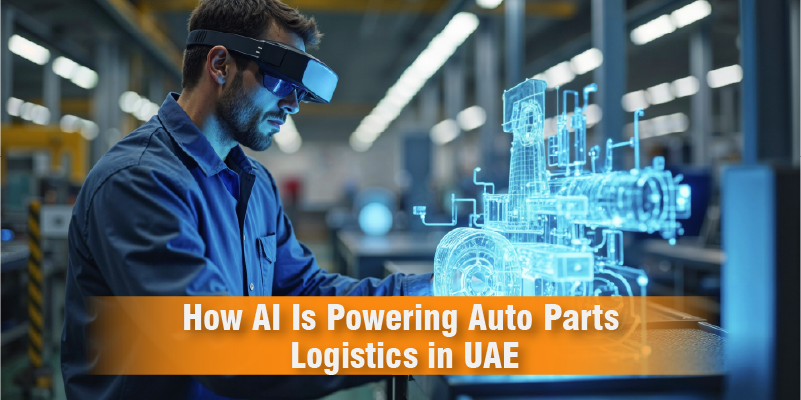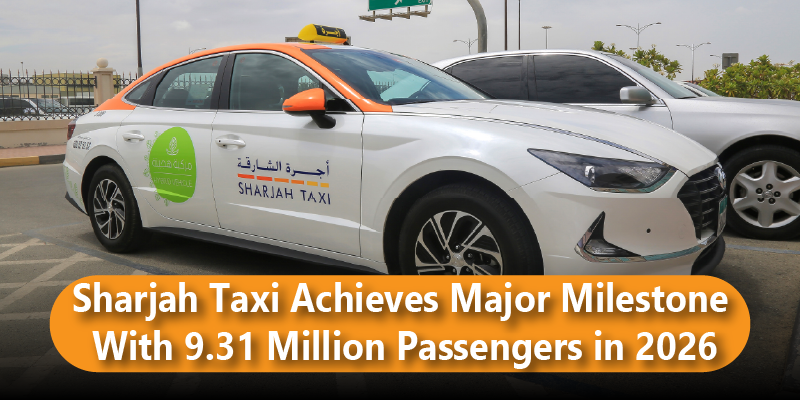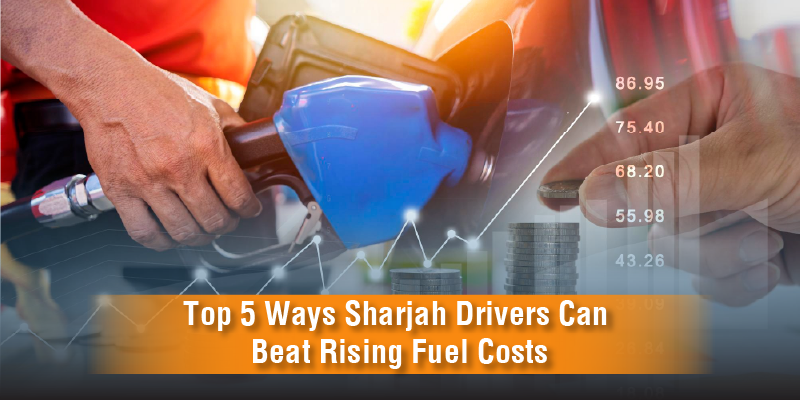The UAE’s automotive industry is entering a new era of transformation—one where artificial intelligence (AI) is not just an added advantage but the core driver of innovation. As vehicle technology advances, so does the complexity of managing spare parts, deliveries, and services. That’s where AI logistics UAE comes into play, revolutionizing how companies manage the auto parts supply chain—from intelligent demand forecasting to real-time route optimization and advanced warehouse automation.
Let’s take a deep dive into how AI is reshaping the landscape of auto parts logistics and making the UAE’s automotive ecosystem smarter, faster, and more efficient than ever.
The Growing Need for AI in the UAE’s Auto Parts Logistics
The UAE stands at the crossroads of global trade and innovation. With Dubai’s world-class ports, Abu Dhabi’s industrial might, and Sharjah’s logistics hubs, the region demands speed, precision, and reliability. Yet, traditional spare parts logistics often face issues like:
- Delayed part deliveries
- Over-stocking or under-stocking critical items
- Inefficient warehouse space utilization
- Lack of real-time tracking and forecasting
In an industry where every minute counts—especially for premium and performance vehicles—AI brings the much-needed intelligence to predict, optimize, and automate. By integrating AI logistics UAE, automotive businesses can overcome supply chain disruptions and ensure every customer receives exactly what they need, right when they need it.
1. Smarter Demand Forecasting: Predicting Tomorrow, Today
One of the biggest challenges in the auto parts supply chain is uncertainty. The demand for specific components can fluctuate dramatically—seasonal maintenance, unpredictable breakdowns, or new model launches can shift requirements overnight.
This is where AI-powered demand forecasting makes a remarkable difference.
Using machine learning, AI analyses large volumes of data—such as past sales, service logs, regional usage patterns, and even weather conditions—to forecast which parts will be needed next.
For example:
A luxury car service center in Dubai might predict that brake sensors for European models will spike in demand during summer due to heat-related wear. AI captures these micro-patterns, ensuring that inventory is always aligned with real-time market needs.
Benefits of AI-driven demand forecasting:
- Reduces stock-outs and excess inventory
- Enhances order accuracy
- Improves turnaround time for customers
- Minimizes waste and capital blockage
With demand forecasting, AI empowers suppliers to plan inventory proactively rather than reactively—creating a smoother, leaner auto parts supply chain.
2. Warehouse Automation: The Digital Backbone of Modern Logistics
Once you know what to stock, the next challenge lies in where and how to store it. Traditional warehouses often struggle with human error, misplaced parts, and time-consuming manual sorting.
AI steps in through warehouse automation—a combination of robotics, computer vision, and predictive systems that streamline operations.
Here’s how it works:
- AI categorizes and labels each part digitally, using image recognition and metadata.
- Automated robots and conveyors pick and move items with minimal human input.
- Sensors and IoT devices track real-time inventory status, instantly updating ERP systems.
- Predictive algorithms forecast restocking needs and prevent dead stock accumulation.
In the UAE, where premium vehicle brands and massive fleets coexist, AI logistics UAE ensures every nut, bolt, and component is exactly where it should be—cutting downtime and maximizing output.
Warehouse automation also enhances worker safety and operational accuracy, especially in high-volume warehouses serving brands like Mercedes, BMW, or Toyota.
3. Route Optimization: Delivering Speed and Sustainability
Once the part is ready for dispatch, the next mission is delivery—fast, safe, and efficient.
Here’s where AI-driven route optimization shines.
AI uses real-time traffic data, GPS signals, delivery constraints, and predictive analytics to map the most efficient delivery routes. In the UAE’s bustling urban zones—Dubai Marina, Abu Dhabi Corniche, or Sharjah Industrial Area—this technology helps logistics companies bypass congestion and deliver faster.
For example:
- If an urgent engine part needs to reach a workshop in Al Quoz, AI automatically assigns the nearest available driver and calculates the quickest route, factoring in traffic, tolls, and fuel efficiency.
Advantages of route optimization:
- On-time deliveries and reduced delays
- Lower fuel consumption and emissions
- Real-time tracking and updates for customers
- Enhanced driver productivity
By integrating route optimization with warehouse automation and demand forecasting, the entire logistics chain becomes smarter, leaner, and more sustainable—perfectly aligned with the UAE’s sustainability goals and Vision 2030.
4. AI in Customs, Documentation & Trade Compliance
The UAE’s role as a logistics hub means every major shipment passes through ports, airports, and free zones. Manual customs clearance and trade documentation often slow the process—but AI is changing that narrative.
Through advanced document processing and machine learning, AI can:
- Scan and verify trade documents
- Automate customs declaration forms
- Detect inconsistencies or missing data
- Predict clearance timeframes and potential delays
According to Beam.AI’s UAE case study, AI logistics UAE solutions now enable real-time monitoring of customs SLAs, drastically reducing hold-ups and improving accuracy. For the auto parts sector, this means faster imports, fewer clearance errors, and smoother global trade operations.
5. Intelligent Inventory Management: The Bridge Between Data and Delivery
AI doesn’t just automate tasks—it learns from them. Over time, it identifies patterns and continuously improves inventory decisions.
It predicts which parts move faster, which suppliers deliver quicker, and which routes are the most reliable.
This constant learning process ensures your auto parts supply chain remains adaptive to market shifts and customer demands.
The result? Lower operational costs, improved profitability, and happier customers.
The UAE Advantage: Why AI Adoption Is Accelerating
The UAE government actively promotes digital transformation across logistics and automotive industries. Smart Dubai and Dubai Customs initiatives have already implemented AI for smarter clearance systems, data analysis, and sustainability monitoring.
This supportive ecosystem encourages both startups and established enterprises to adopt AI logistics UAE solutions that integrate predictive analytics, automation, and intelligent routing.
With growing e-commerce, electric vehicle expansion, and rising demand for luxury car services, AI-powered logistics have become the defining factor separating leaders from laggards in the UAE market.
Top Benefits of AI in Auto Parts Logistics
- Speed – Faster processing, dispatch, and delivery cycles.
- Accuracy – Fewer order errors and incorrect part shipments.
- Cost Reduction – Optimized inventory, fuel, and manpower usage.
- Transparency – Real-time tracking of every order and shipment.
- Customer Experience – Predictive updates, accurate ETAs, and consistent reliability.
Together, these create a strong foundation for growth and trust in the auto parts supply chain—especially in an economy where service excellence defines brand reputation.
Challenges in AI Implementation
While the benefits are immense, implementing AI does come with challenges:
- High setup and integration costs
- Need for skilled data professionals
- System training and adaptation time
- Cybersecurity and data privacy concerns
However, these are short-term hurdles. As more UAE companies adopt cloud-based logistics platforms, these challenges are quickly being overcome with scalable, secure, and cost-efficient AI solutions.
5 Frequently Asked Questions
It refers to the integration of AI-based tools into logistics operations in the UAE, including forecasting, warehousing, delivery routing, and customs automation.
AI connects all points—from supplier to customer—ensuring accurate demand forecasting, real-time visibility, and data-driven decisions.
Route optimization uses AI algorithms to find the best travel paths for deliveries, reducing time, cost, and carbon footprint.
Yes. Through warehouse automation, AI can manage storage allocation, picking accuracy, and replenishment with minimal human input.
Absolutely. Scalable AI platforms now cater to small and mid-sized firms, offering affordable tools for forecasting, tracking, and automation.
Closing Remarks: Driving the Future of Auto Parts Logistics
AI logistics UAE isn’t just a technology trend—it’s the foundation of the next generation of automotive supply chains.
From demand forecasting that predicts needs before they arise, to warehouse automation that eliminates human error, and route optimization that gets parts where they’re needed fastest—AI is redefining efficiency, sustainability, and customer satisfaction.
The UAE’s forward-thinking infrastructure and smart government initiatives make it the perfect landscape for these technologies to flourish. The result? A logistics ecosystem that’s intelligent, adaptive, and built for the future of mobility.
Partner with Miss Auto UAE – Where Innovation Meets Performance
At Miss Auto UAE, we don’t just deliver auto parts—we deliver precision, speed, and reliability powered by the latest in AI logistics UAE technology. Whether you’re managing a fleet, running a luxury service center, or handling large-scale parts distribution, we optimize every link of your auto parts supply chain.
Experience the future of logistics—where AI ensures every part, every order, and every delivery meets perfection.
Contact Miss Auto UAE today to revolutionize your auto parts logistics with intelligent solutions that drive your business forward across Dubai, Abu Dhabi, Sharjah, and beyond.







